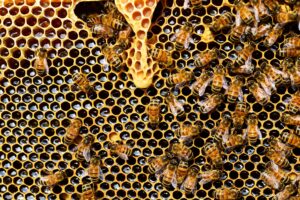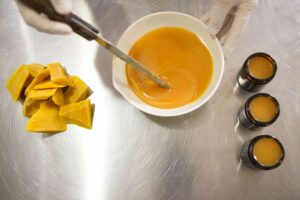Investigating the Green Practices

In the vast landscape of skincare, where innovation and tradition converge, beeswax emerges as a golden elixir bestowed upon us by nature’s diligent workers – bees. Beyond its luxurious texture and skin-nourishing properties, the sustainability of beeswax has become a critical consideration in the conscientious realm of beauty. Join us on a journey through the hive as we investigate the buzz on beauty, exploring the eco-friendly facets and sustainable practices surrounding beeswax in skincare.
The Nectar of the Bees
Beeswax, a natural secretion from worker bees, plays a pivotal role in the construction of honeycombs. This waxy substance is derived from the honey-making process, where bees convert nectar into honey. The excess beeswax is harvested by beekeepers, ensuring the well-being and continuity of the hive.
Sustainability in beeswax production hinges on regenerative harvesting practices. Responsible beekeepers prioritize the health and vitality of their colonies, leaving enough beeswax for the hive’s structure and function. By allowing bees to regenerate wax naturally, beekeepers ensure the long-term well-being of their colonies.
Eco-Friendly Beeswax Extraction
In sustainable beekeeping, the extraction of beeswax emphasizes chemical-free methods. Conscientious beekeepers utilize manual or mechanical means to separate beeswax from honeycombs, avoiding the use of harmful chemicals that can compromise the purity of the wax.
Some forward-thinking beekeeping operations have embraced solar-powered processing facilities. By harnessing the sun’s energy, these facilities reduce their environmental footprint, aligning with eco-friendly practices that prioritize renewable energy sources.
Beeswax Farming and Biodiversity
Sustainable beekeeping is synonymous with natural beekeeping practices. This approach minimizes human intervention, allowing bees to thrive in their natural habitat. By avoiding the use of pesticides and antibiotics, beekeepers contribute to the overall health of the bee population and surrounding ecosystems.
Bees play a crucial role in pollination, contributing to the biodiversity of plant species. Sustainable beekeeping practices support healthy bee colonies, fostering a balance in ecosystems. Through this symbiotic relationship, the beauty industry can champion biodiversity conservation and contribute to the well-being of the planet.
Sustainable Beeswax in Skincare
Hydrating Elegance: Beeswax is renowned in skincare for its hydrating and emollient properties. When sourced sustainably, it becomes not only a treat for the skin but also a symbol of harmony between human beauty rituals and nature’s intricate dance.
Locking in Moisture: In skincare formulations, beeswax acts as a natural humectant, helping the skin retain moisture. Its occlusive properties create a protective barrier, preventing dehydration and promoting a supple complexion.
Balancing Act: For those with sensitive or reactive skin, sustainably sourced beeswax can be a gentle yet effective ingredient. Its soothing qualities make it suitable for a variety of skincare products, from balms to creams, providing a delicate touch for skin in need of balance.
Navigating Sustainability Certifications
For eco-conscious consumers, seeking products containing certified organic beeswax is a wise choice. Organic certification ensures that the beeswax is sourced from beekeeping practices that align with stringent environmental and ethical standards.
Some beauty brands actively participate in bee-friendly initiatives. By supporting these brands, consumers contribute to the conservation of bee habitats and the promotion of sustainable beekeeping practices. Look for brands that transparently communicate their commitment to bee-friendly initiatives and biodiversity conservation.

Ethical Transparency
Transparent supply chains are a hallmark of sustainable beauty. Brands committed to ethical practices provide consumers with information on the origin of their beeswax, detailing the journey from hive to product. This transparency ensures that consumers can make informed choices that align with their values.
For an added layer of ethical consideration, some beauty brands engage in fair trade practices with beekeepers. Fair trade ensures that beekeepers receive fair compensation for their efforts, fostering a mutually beneficial relationship between producers and consumers.
The Future of Beeswax in Beauty
As we delve into the intricate web of sustainability surrounding beeswax in skincare, it becomes clear that the beauty industry’s commitment to ethical practices is crucial. By choosing products that prioritize sustainable beekeeping, consumers become advocates for the well-being of bees and the preservation of biodiversity.
In the grand tapestry of beauty, where the quest for radiant skin meets the preservation of nature, sustainable beeswax stands as a symbol of harmony. Let us continue to investigate, choose wisely, and collectively embrace the buzz on beauty with a consciousness that extends beyond our reflections in the mirror—into the thriving, interconnected world of bees and blossoms.




